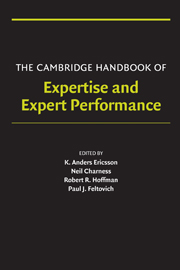Book contents
- Frontmatter
- Contents
- Acknowledgments
- Contributors
- PART I INTRODUCTION AND PERSPECTIVE
- PART II OVERVIEW OF APPROACHES TO THE STUDY OF EXPERTISE – BRIEF HISTORICAL ACCOUNTS OF THEORIES AND METHODS
- PART III METHODS FOR STUDYING THE STRUCTURE OF EXPERTISE
- PART IV METHODS FOR STUDYING THE ACQUISITION AND MAINTENANCE OF EXPERTISE
- PART V DOMAINS OF EXPERTISE
- PART V.A PROFESSIONAL DOMAINS
- 19 Expertise in Medicine and Surgery
- 20 Expertise and Transportation
- 21 Expertise in Software Design
- 22 Professional Writing Expertise
- 23 Professional Judgments and “Naturalistic Decision Making”
- 24 Decision-Making Expertise
- 25 The Making of a Dream Team: When Expert Teams Do Best
- PART V.B ARTS, SPORTS, & MOTOR SKILLS
- PART V.C GAMES AND OTHER TYPES OF EXPERTISE
- PART VI GENERALIZABLE MECHANISMS MEDIATING EXPERTISE AND GENERAL ISSUES
- Author Index
- Subject Index
- References
21 - Expertise in Software Design
from PART V.A - PROFESSIONAL DOMAINS
- Frontmatter
- Contents
- Acknowledgments
- Contributors
- PART I INTRODUCTION AND PERSPECTIVE
- PART II OVERVIEW OF APPROACHES TO THE STUDY OF EXPERTISE – BRIEF HISTORICAL ACCOUNTS OF THEORIES AND METHODS
- PART III METHODS FOR STUDYING THE STRUCTURE OF EXPERTISE
- PART IV METHODS FOR STUDYING THE ACQUISITION AND MAINTENANCE OF EXPERTISE
- PART V DOMAINS OF EXPERTISE
- PART V.A PROFESSIONAL DOMAINS
- 19 Expertise in Medicine and Surgery
- 20 Expertise and Transportation
- 21 Expertise in Software Design
- 22 Professional Writing Expertise
- 23 Professional Judgments and “Naturalistic Decision Making”
- 24 Decision-Making Expertise
- 25 The Making of a Dream Team: When Expert Teams Do Best
- PART V.B ARTS, SPORTS, & MOTOR SKILLS
- PART V.C GAMES AND OTHER TYPES OF EXPERTISE
- PART VI GENERALIZABLE MECHANISMS MEDIATING EXPERTISE AND GENERAL ISSUES
- Author Index
- Subject Index
- References
Summary
Keywords: software design, programming, computer program, debugging, communication, knowledge representation, Professionals.
Introduction
In this chapter, we review research evidence on expertise in software design, computer programming, and related tasks. Research in this domain is particularly interesting because it refers both to rather general features and processes associated with expertise (e.g., knowledge representation, problem-solving strategies) and to specific characteristics of high performers in an economically relevant real-world setting. Therefore, in this chapter we draw on literature from various fields, mainly from cognitive psychology, but also from work and organizational psychology and from the software-design literature within computer science.
Our chapter is organized as follows: In the first main section we provide a brief description of the domain and give an overview of tasks in software development. Next, we briefly describe the expertise concept and distinguish between a conceptualization of expertise as years of experience and expertise as high performance. The third main section is the core part of this chapter. In this section, we review empirical research on expertise in tasks such as software design, programming, program comprehension, testing, and debugging. Moreover, we describe how expert performers differ from non-experts with respect to knowledge as well as communication and cooperation processes. In the final section, we present directions for future research and discuss some practical implications.
Historical Context
Extensive research on expertise on software design and programming started in the early 1980s.
- Type
- Chapter
- Information
- The Cambridge Handbook of Expertise and Expert Performance , pp. 373 - 388Publisher: Cambridge University PressPrint publication year: 2006
References
- 31
- Cited by

